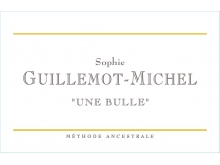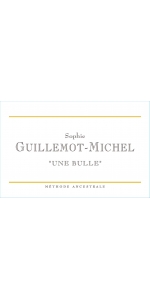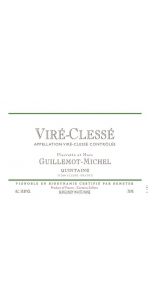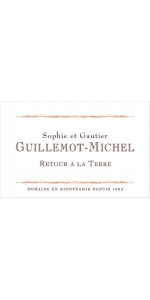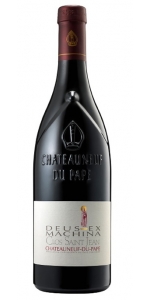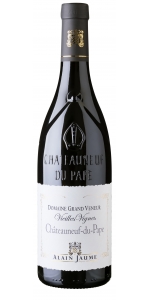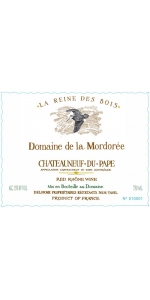Guillemot-Michel Une Bulle 2022
6 bottles with free shipping for: $300.00
12 bottles with free shipping for: $540.00
| BUY MORE! SAVE MORE! | ||||||||||||||||||||
|
| Country: | France |
| Regions: | Burgundy Maconnais |
| Winery: | Guillemot-Michel |
| Grape Type: | Chardonnay |
| Organic: | Yes |
| Vintage: | 2022 |
| Bottle Size: | 750 ml |
Guillemot-Michel Une Bulle is made from 100% Chardonnay.
This cuvée was created originally to celebrate the wedding of daughter Sophie Guillemot and Gautier!
The Chardonnay grapes come from a historic parcel of the estate - La Lie-Monin - that had been leased for nearly 30 years and that the family decided to cultivate again in 2013 following up a change of viticulture practice (towards organic) from their main neighbor.
"Bulle" is produced with the "methode ancestrale" - meaning only natural sugars are used from grapes that are harvested at optimum maturity, being less acidic and more aromatic, giving a beautiful fresh and elegant sparkling wine of crisp and juicy flavors, firm acidity and a long finish.
White meat, dessert, fruits, mild cheese, delicious on its own
The Domaine Guillemot-Michel Estate
Pierrette and Marc Guillemot took over the Domaine from Pierrette's parents in 1985. Pierrette and Marc are both oenolgists from the school of Beaune and post-graduates from Montpellier. They have applied their studies and have married both scientific and homeopathic principles in their winemaking. The Domaine is located in the commune of Quintaine, adjacent to the village of Clesse, South of Burgundy. Quintaine is recognized as producing some of the finest wines of the Mâconnais, having a special microclimate caused by the close proximity of the Saone river. The winery became biodynamic in 1991. They produce around 3,000 cases yearly and export 85% of the production (UK, USA, Belgium, Swizerland, Germany, Japan, etc)
"A tiny biodynamic estate making highly individual wines; the grapes are picked ripe, resulting in high alcohol levels and viscous textures; residual sugar not uncommon here."
- Anthony Dias Blue's pocket guide to wine 2006
The Domaine Guillemot-Michel Vineyard
This 7-hectare (17.3 acres) vineyard on a clay and limestone based soil has been cultivated through biodynamic and organic methods since 1991 (the Biodynamic method regards the earth as a living organism and strives to renew the soil in order to produce food that is full of vitality and deeply nourishing. Biodynamics notes the interrelationship of all kingdoms - mineral, plant, animal and human - and their intricate correspondence to the rhythms and activities of the larger cosmos). That means they work in harmony with the cycle of the vines and the soil. They don't use any chemicals and prefer mineral and vegetal treatments. They work the soil using manual and mechanical methods but they treat the vines only manually.
The wine is 100% Chardonnay and goes through 100% Malolactic fermentation with no use of oak. The vines average 45 years of age with a typical yield of only 2.5 tons per acre. Marc and Pierrette are constantly experimenting, searching for new ideas, willing to take on board both traditional and modern methods.
Guillemot-Michel Une Bulle is made from 100% Chardonnay.
This cuvée was created originally to celebrate the wedding of daughter Sophie Guillemot and Gautier!
The Chardonnay grapes come from a historic parcel of the estate - La Lie-Monin - that had been leased for nearly 30 years and that the family decided to cultivate again in 2013 following up a change of viticulture practice (towards organic) from their main neighbor.
"Bulle" is produced with the "methode ancestrale" - meaning only natural sugars are used from grapes that are harvested at optimum maturity, being less acidic and more aromatic, giving a beautiful fresh and elegant sparkling wine of crisp and juicy flavors, firm acidity and a long finish.
White meat, dessert, fruits, mild cheese, delicious on its own
Review:
"Bursting with aromas of apples, pears, almonds, warm bread and dried fruits, the 2019 Méthode Ancestrale Une Bulle is medium to full-bodied, fleshy and concentrated, with lively acids and a pillowy mousse. It's a touch drier than its 2018 counterpart. - William Kelley"
- Robert Parker's Wine Advocate (August 2021), 92 pts
Guillemot-Michel Vire Clesse (magnum) is made from 100 percent Chardonnay.
Beautifully expressive, with yellow fruits, orange blossom, smoke & flint. Thick and saline on entry, then seriously deep in the mid-palate, with suggestions of exotic fruits perfectly countered by strong minerality. This wine strikes a perfect balance between sweet and salty elements, and it shows vibrant acidity. It boasts a thickness that few other northern Mâconnais can match.
Enjoy with fish (such as sole meuniere), seafood, roasted chicken, goat cheese.
Guillemot-Michel Vire-Clesse Retour a la Terre is made from 100 percent Chardonnay.
This cuvée is produced from grapes planted in the "Champ-Rond" vineyard and vinified in 800-liter amphoras.
The wine displays the estate's typical exotic fruit aromas and ripe citrus fruits with an extra dimension of expression due to the amphora's breathing. Ample and generous in the mouth with fine acidity and fantastic purity.
Guillemot-Michel Vire-Clesse Retour a la Terre is aged in 800-liter amphoras. The small grapes ripen beautifully without a high degree of alcohol - they are picked on the last day of the harvest, and the aging in amphora gives the wine a great purity.
The vines are grafted on "Riparia Gloire de Montpellier" - an old root-stock that was obtained in 1880 - producing very low yields with magnificent small grapes of a deep gold color.
Clos Saint-Jean is a 41-hectare estate in Châteauneuf-du-Pape run by brothers Vincent and Pascal Maurel. Considered by many critics and wine-writers as the preeminent estate espousing the modern style of winemaking in Châteauneuf, this cellar is one of the oldest in the region, having been founded in 1900 by the greatgreat-grandfather of Vincent and Pascal, Edmund Tacussel. A short time after its founding and well before the AOP of Chateauneuf-du-Pape was created in 1923, Edmund began bottling estate wines in 1910.
The farming at Clos Saint-Jean is fully sustainable due to the warm and dry climate, which prevents the need for chemical inputs. Instead, Vincent and Pascal employ organic methods for pest control, mainly pheromones, to prevent pests from taking up residence in their vines, a process called amusingly enough in French, confusion sexuelle. The vines tended manually, and harvest is conducted in several passes entirely by hand.
Deus ex Machina is a literary and dramatic term for a miraculous intervention that interrupts a logical course of events in a plot or play. A suitable name for a cuvée that had it’s start in the torrid vintage of 2003 when Philippe Cambie and Vincent Maurel made the decision to harvest at the end of September, weeks after their neighbors. Deus ex Machina is a blend of old vine Grenache from La Crau, aged in tank with equally ancient Mourvedre from the sandy soils of BoisDauphin aged in demi-muid. Deus ex Machina is only made in the best vintages.
Review:
Lastly, the 2022 Châteauneuf Du Pape Deus-Ex Machina shows a similar profile to the Combes des Fous, yet it brings another level of tannins and concentration. Kirsch liqueur, white flowers, sandalwood, cured meats, and graphite notes all shine here, and it's full-bodied, has a deep, layered, powerful, yet weightless profile, lots of ripe tannins, and a blockbuster of a finish. This ripe, sexy, seamless, incredibly impressive beauty will compete with anything in the vintage. As usual, this cuvée is 60% Grenache and 40% Mourvedre, which is brought up in roughly 40% new demi-muids.
Review: Jeb Dunnuck 97 Points
Grand Veneur Chateauneuf Du Pape Vieilles Vignes is made from 50% Grenache, 40% Mourvedre, 10% Syrah
Matured in concrete vats (40%) and oak casks (60%)
It boasts an inky/purple color in addition to a gorgeous perfume of crushed rocks, jammy black fruits, charcoal and graphite. Blackberry aroma with an air of dates pressed in alongside – this is sweet-noted. It is easy to appreciate, a sleek and stylish start. The palate holds excellent fruit that runs well and has kick. Its tannins move round freely and a minted finale comes forward. Its dark fruit is tasty, darkens on the finish, where tar and char from its oak enter. It is all very much together, a bundle of harmony, and will gain local attributes as it ages.
An outstanding Chateauneuf du Pape which display the best of its terroir.
The vines are 50 to 100+ year old. They are planted on red clay soils covered with pebble stones.
Harvest is destemmed and crushed. Fermentation temperature is controlled at 30°C. Vatting period of 18 to 20 days. Matured in concrete vats (40%) and oak casks (60%).
The vineyards are located in the north of Châteauneuf du Pape. GRAND VENEUR «Vieilles Vignes» cuvee is produced from the older vines. Thanks to time and an organic growing, roots go very deep in the soil. Yields are naturally low and grapes highly concentrated.
The vines are 50 to 100+ year old. They are planted on red clay soils covered with pebble stones.
Winemaking and aging
Harvest is destemmed and crushed. Fermentation temperature is controlled at 30°C. Vatting period of 18 to 20 days. Matured in concrete vats (40%) and oak casks (60%).
Pair with venisson, duck, braised lamb or strong cheese.
Review:
"Blackberries, roasted garrigue, licorice, and spice notes all define the aromatics of the 2022 Châteauneuf du Pape Vieilles Vignes, a broad, expansive, opulent Châteauneuf du Pape that has velvety tannins and a huge finish. Based on 40% Grenache, 45% Mourvèdre, and the rest Syrah, with the Grenache brought up in concrete tanks and the Syrah and Mourvèdre in barrel, it shows a kiss of the modern style found in the Les Origines but is just pure Châteauneuf du Pape magic with its purity, opulence, and elegance. It's a gorgeous 2022 that should benefit from just a few years in the cellar and evolve gracefully over the following 15+ years. If you see a bottle, buy it."
- Jeb Dunnuck (Importer Highlight: Fran Kysela ; July 2024), 97 pts
Mordoree Chateauneuf-du-Pape La Reine des Bois is made from 80% Grenache, 10% Mourvèdre, and the rest equal parts Syrah and Vaccarèse .
This premium cuvee - whose name means "Queen of the Woods" - is from 65-year-old vines, planted on Villafranchian-era terrasses. Yield is 30 hl/ha.
Deep ruby red; opaque. Aromas of red fruits change to wooden touches of leather, black truffles and coffee. Fat, concentrated and full flavored with a very long liquoriced and fruity finish.
Review:
The 2022 Châteauneuf du Pape Cuvée De La Reine Des Bois is based on 75% Grenache, 10% each Syrah and 10% Mourvèdre, and the rest Counoise and Vaccarèse. It's not massive yet just exudes class and elegance, with both red and black fruits that give way to more spice, peppery garrigue, and leather, with classic background licorice and black olive notes. Medium to full-bodied, beautifully balanced, and elegant, with silky tannins, this brilliant Châteauneuf du Pape will evolve for two decades.
Number 36 in Dunnuck's Top 100 and 97 Points
"Huge and powerful, but so fresh. This has great driving intensity, with even bigger, more structural tannins than the domaine’s other cuvée. A rampaging Châteauneuf that will take time to settle, and will always be wild. Long, vibrant and chiselled. An absolute beast. Mordorée has been massive but overripe in the past; it's still massive but with this vintage the ripeness is more controlled, and it has transformed into something extraordinary. Fermented and aged 80% in stainless steel, the rest in old barrels. - Matt WALLS"
- Decanter Magazine (September 17th 2023, Part of Châteauneuf-du-Pape 2022: Report and top-scoring wines), 98 pts
- back
Boeira Tawny 50 Year Port is produced from Touriga Nacional, Touriga Franca, Tinta Roriz, Tinta Barroca and Tinto Cao.
Brownish color with strong coppery reflections. Toasted almonds and dried fruit stand out on the nose, with a delicate sweetness. Intense flavors on the plate, but a refinement and elegance that reflects its level of ageing. A very long evolving finish.
Boeira 50 Years Old Port is excellent as a digestive.
pH : 3.57TA : 9.48 g/L
RS : 152g/L
Then, it is aged for 50 years in 550 liter French oak barrels.
Traditional Porto winemaking with skin contact maceration and short alcoholic fermentation in stainless steel tanks followed by fortification.
Xavier Vignon Cotes du Rhone Blanc is 40% Viognier, 30% Grenache, 20% Roussane, & 10% Picpoul.
From Vienne to Avignon, the Côtes du Rhône appellation is one of the largest in the french vineyard.
Around 6% of the area is dedicated to the production of grapes from varieties that can be vinified as white wine.
Brilliant yellow with gold highlights.
Suave and generous taste. Long saline finish with good acidity.
Perfumes of yellow fruit, citrus, white flowers with mineral notes.
A fresh, fruity and mineral wine that pairs best with French onion soup, green vegetables, risottos, light pastas and goat cheese.

